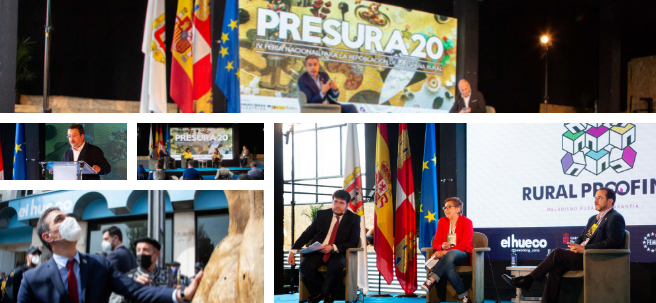
31 de May de 2021
May 31, 2021. But who really thinks about rural areas? Under this premise, the 4th National Fair for the Repopulation of Rural Spain, "Presura20," organized by the coworking space El Hueco, has turned Soria into a summit on the demographic challenge, attended by figures of high political responsibility in this field and prominent figures in rural development.
- The National Fair for the Repopulation of Rural Spain "Presura20" brings together top political leaders and rural development figures in Soria to address the demographic challenge.
The fair took place on May 28th after several cancellations due to the pandemic. Unlike previous editions, which lasted three days and featured rural exhibitors, this year it featured only speakers, with no general public attendance.
The meeting called for the same fundamental legislative role that rural areas already play in society, while also emphasizing the urgent need to engage rural communities in the new digital era that cosmopolitan societies are entering.
Rural guarantee mechanism
Joaquín Alcaide, director of El Hueco , opened the event by calling for a "ruralization" of laws, that is, for specific legislation for rural areas. In Alcaide's words, the new rurality of the 21st century is based on two pillars: rural entrepreneurship and social innovation.
Next, the President of the Spanish Government, Pedro Sánchez, used data to confirm "interprovincial migration between urban and rural areas" and outlined some of the government's priority objectives for the upcoming demographic challenge strategy:
- Territorial cohesion, to revitalize towns.
- 100% connectivity, both in broadband and logistics connections.
- Tangible measures for residents.
The meeting served to present the work carried out by the G100 —a group of rural experts created by El Hueco—to launch a " Rural Proofing Mechanism" in Spain. This mechanism would serve to review current rural legislation and ensure that new laws benefit not only cities but also villages. In short, it would ensure that rural areas are considered in political decision-making. This mechanism is already in place in other countries such as England, Canada, and Finland.
Rural reflections
"There are no towns without a future: there are towns without projects." Following this premise launched by the moderator of the roundtables, Raúl Conde, a journalist from the newspaper El Mundo, a series of talks and meetings took place among numerous personalities of different backgrounds: Ione Belarra, Minister of Social Rights and the 2030 Agenda; Concha Andreu, President of the Government of La Rioja; Pablo Casado, President of the Popular Party; María Chivite, President of the Government of Navarre; José Luis Rodríguez Zapatero, former President of the Government of Spain; Manuel Campo Vidal, journalist; and a long list of other personalities who participated in various roundtable discussions. The fair was closed by Teresa Ribera, Minister of Ecological Transition and Demographic Challenge.
A common denominator has united all the interventions: the digital factor, and the need for rural Spain not to be left behind or left behind in these new times. "Digitization entails decentralization : this is the great opportunity for the rural world," said Elena Pisonero, president of the Maragatería Foundation .
Or, as journalist Manuel Campo Vidal has pointed out, "The time for regrets and diagnoses is over. All that remains is to propose solutions."
You can watch the entire fair here .









